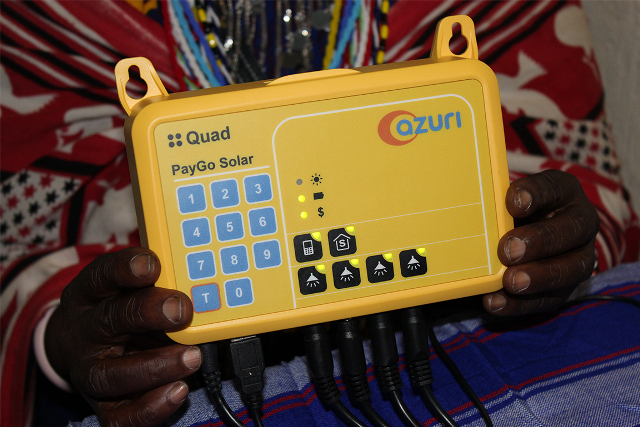NAIROBI, Kenya 18 May – Azuri Technologies has set up a fully fledged East Africa office based in Nairobi as ground work for an all-out expansion plan in Africa.
The pay-as-you-go solar company has had a four-year ‘testing’ period in Africa that has seen Azuri sell 80,000 solar units in 12 African countries through partners. 17,000 of these solar units have been sold in Kenya through the novel but highly effective daily payments done via mobile money.
This model has seen Kenya take the lead in off-grid pay-as-you-go solar social enterprises with over 3 million homes now connected to these systems. Azuri joins a growing number of companies venturing in pay-go solar systems including Mobisol, M-KOPA Solar and SolarNow.
But the market is big enough. Less than half of Kenya’s 40 million population is covered by the national grid, leaving millions in the dark.
Snehar Shah, who has been appointed to head Azuri’s regional office covering five countries, says Kenya’s early lead in has been aided by a progressive and vibrant environment that has seen the government do away with duty and VAT on solar units and related parts.
This, and the fact that mobile money is almost ubiquitous, has elevated Kenya to the position of a case study in providing affordable, clean and scalable energy to millions in power–deficient areas.
“The way I see the solar energy market is similar to how mobile technology was 10 to 15 years ago. It is just the beginning. Just half a million homes are covered by solar out of nearly 4 – 5 million homes so the market is very big,” says Shah, who has 20 plus years of experience in the telcom industry and was in charge of launching Orange Money in Kenya.
But unlike the telcos – where only a few players can marshal the massive initial capital – solar energy companies can quickly launch, as long they get the execution right.
Shah says Azuri has taken time to understand the market and what the customers want and are confident they have the right formula.
Part of the formula, Shah explains, is hinged on being mobile money agnostic.
“The differentiator that we have, compared to our competitors, is that we work with all mobile money platforms as opposed to restricting our customers to a particular network,” says Shah.
Shah says transaction costs are lower due to the fact that customers have a variety of payment options including M-Pesa, Orange Money, Equitel, Airtel Money and directly from a customer’s bank account
“Azuri does not charge a deposit hence lowering the entry barrier for a majority of the rural population who cannot afford a deposit,” adds Shah.
The UK-based technology has two solar products. The basic and the most popular in the market has two lights and a mobile phone charger for Sh31.50 per day.
The second, more premium offering, comes with four lights, a mobile phone charger, radio and a torch for Sh50 per day. All allowing flexible payment terms of up to 18 months.
Azuri thrives on building a strong agent network working with existing local partners with an emphasis on agent – customer relationship.
The solar gadgets permeating across rural Kenya are having a ripple effect on the productivity and health of households who have for years been dependent on the often smoky kerosene lamps for lighting.
Now that the benefits of the affordable solar systems are spreading across regions and customers, demand for additional services is growing.
Azuri has plans to launch a TV product linked to the solar system by the end of the year with plans to launch productive assets like irrigation products that use solar.
“In Rwanda, the government has an objective of putting 250,000 solar units in the hands of the citizens and Azuri is part of the consortium engaged to deliver this objective. In Uganda, we are planning to bundle smartphones with the solar systems,” says Shah.
Shah adds that with the growth of the pay as you go solar sector, mini-grid solar plants for a community or village is not farfetched as financiers like World Bank’s IFC and NGOs line up to invest in green energy initiatives.



































